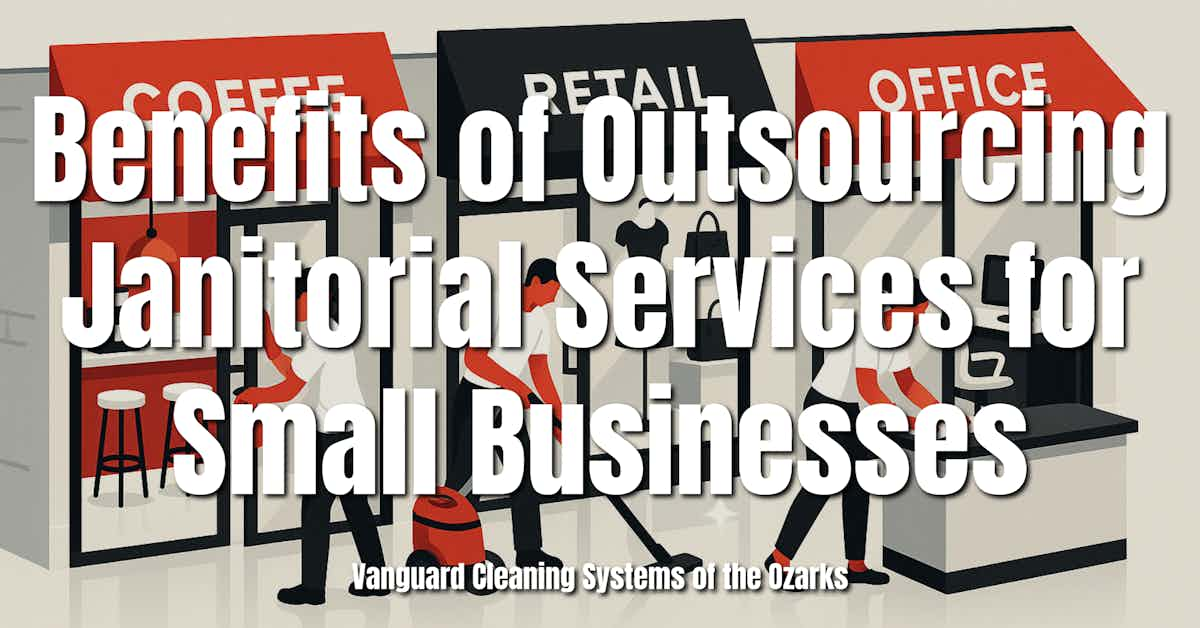Smart outsourcing can free up resources, cut costs, and elevate service quality—giving small businesses in the Ozarks and Tulsa a competitive edge.

Why Small Businesses in the Ozarks and Tulsa Are Rethinking Janitorial Services
Why This Matters to Small Businesses
Many small businesses operate on tight budgets, with limited staff and unpredictable demand. Every dollar and every hour counts. Managing janitorial services in-house can quietly drain both.
Cleaning is a necessary but non-core function. It requires time, oversight, equipment, supplies, and training. For a small business owner, these are costs—both financial and strategic—that can shift focus away from core growth activities.
Outsourcing janitorial services offers a way to reclaim that focus. Done well, it can deliver better quality, reduce costs, and create more agility in daily operations.
What You Will Learn
This report pulls together insights on how outsourcing janitorial services benefits small businesses:
- Practical advantages documented across industries
- Real-world lessons from Tulsa-area and Ozarks businesses and public initiatives
- Actionable guidance to help business owners evaluate and implement the right outsourcing strategy
How This Report Is Structured
You’ll find three key sections:
- Core Benefits: Proven outcomes from outsourcing, drawn from a broad base of research
- Regional Insights: What businesses in Tulsa and the Ozarks can learn from local examples
- Recommendations: Practical next steps for deciding if, when, and how to outsource janitorial services
Core Benefits of Outsourcing Janitorial Services
Cost Savings and Operational Efficiency
Outsourcing helps small businesses lower both fixed and variable costs:
- No need to purchase cleaning equipment, uniforms, or ongoing training
- Avoids expenses tied to hiring, payroll taxes, overtime, and benefits
- Businesses commonly see a 17%–22% reduction in total cleaning-related costs
This frees up budget for more strategic investments, while maintaining a professional image for customers and employees.
Access to Professional Expertise and Quality Control
Professional janitorial providers deliver measurable quality advantages:
- Use of advanced cleaning protocols and products not typical of in-house efforts
- Implementation of standardized performance checklists
- Documented improvements in cleanliness and hygiene outcomes
- Access to specialized certifications and equipment (such as ISSA CIMS, Green Seal, GBAC STAR)
For businesses in industries where hygiene impacts customer trust—such as retail, hospitality, or healthcare—these quality gains are critical.
Flexibility and Scalability
Business needs shift. Outsourced janitorial services offer the flexibility to match:
- Service frequency can adjust for seasonal peaks or downturns
- Scope of work can be expanded or contracted as locations grow or consolidate
- Many providers offer month-to-month agreements, reducing the risk of long-term commitments
This agility helps small businesses align cleaning services with actual demand—avoiding waste and optimizing resource use.
Focus on Core Competencies and Strategic Goals
Managing janitorial operations in-house consumes leadership time and focus. Outsourcing enables owners and managers to:
- Reallocate time from supervising cleaning staff to driving business growth
- Free up internal resources to invest in product development, sales, marketing, or customer service
- Create measurable gains in innovation and competitiveness
For any small business looking to scale or differentiate in its market, outsourcing non-core functions like janitorial services can be a strategic lever.
Regional Context: What Businesses in the Ozarks and Tulsa Can Learn
Lessons from the Tulsa Area Community Schools Initiative
- Outsourcing facility maintenance in Tulsa schools led to a significant reduction in operating costs.
- Cleaner environments contributed to measurable gains in student outcomes, such as improved attendance.
- Public-sector models use structured procurement, but small businesses have more flexibility in how they contract services—an advantage that can speed implementation and cost control.
Insights from the Tulsa U.S. Army Corps of Engineers
- Transitioning from mostly in-house maintenance to outsourced services resulted in major cost savings over time.
- Freed leadership and technical staff to focus on mission-critical projects like infrastructure and flood control.
- Small businesses can apply this model by outsourcing janitorial services to allow owners and managers to focus on revenue-driving activities.
Realities of the Ozarks Business Environment
- In industries like forestry, outsourcing labor-intensive operations has proven to reduce costs and improve efficiency.
- Staffing shortages are a common challenge for service-oriented businesses in the region—making outsourcing an effective tool to bridge gaps.
- With tight labor markets and rising operational costs, businesses in the Ozarks increasingly turn to outsourcing to remain competitive and agile.
Synthesis and Insights for Ozarks and Tulsa Small Businesses
Key Takeaways for Business Leaders
Cost Efficiency
- Businesses consistently see 15–22% savings by outsourcing janitorial services.
- Large-scale public projects in Tulsa have demonstrated even higher savings potential, validating the opportunity for businesses of all sizes.
Quality and Compliance
- Professional cleaning providers deliver certified, consistent results.
- These quality standards are especially valuable for offices, retail spaces, and light-industrial environments where appearance and hygiene directly affect customer perception.
Scalability in a Regional Context
- Seasonal businesses—such as those in tourism, hospitality, and event venues—can scale cleaning services up or down with demand.
- Flexible contracts help control costs during slower periods while supporting operational needs during peak seasons.
Managerial Focus and Strategic Growth
- By outsourcing non-core functions, small business owners can redirect their time and resources toward growth-oriented activities like sales, marketing, and product innovation.
- This shift parallels how large public organizations in the region have optimized leadership focus through outsourcing.
Important Considerations
Procurement Differences
- Public-sector outsourcing operates under strict procurement rules.
- Private businesses can leverage more flexible contract terms and faster implementation.
Geographic and Regulatory Context
- International studies offer valuable insights but must be adapted to fit the local business climate, labor laws, and regulatory environment in the U.S.
Limited Local Case Studies
- While the available data provides strong analogies, direct case studies on janitorial outsourcing for small businesses in the Ozarks and Tulsa remain limited.
- Business owners should apply these lessons with thoughtful consideration of their unique circumstances.
Ready to Outsource Your Cleaning?
Discover how our flexible commercial cleaning services can help your Tulsa business stay efficient and spotless.
Recommendations and Next Steps
Practical Steps for Small Businesses in Tulsa and the Ozarks
Vendor Selection Criteria
- Look for cleaning providers with recognized certifications such as CIMS or GBAC STAR.
- Ask for clear performance metrics, including cleanliness scorecards and service turnaround times.
- Prioritize vendors offering flexible, month-to-month contracts with adjustable service scopes.
Cost-Benefit Analysis Framework
- Start by calculating your current in-house cleaning costs: factor in equipment depreciation, labor, and benefits.
- Compare these numbers to vendor quotes, being sure to identify any hidden costs like overtime charges or supply markups.
- Run scenarios to see how costs might change during busy seasons versus slower periods.
Contract Structuring Guidance
- Include service level agreements (SLAs) with clear penalties for missed inspections or performance lapses.
- Define exactly what services are included: daily vs. weekly cleaning, specific floor types, restroom maintenance, and more.
- Negotiate a 60- to 90-day trial period to ensure service quality meets expectations before locking into a longer-term agreement.
Implementation Checklist
- Conduct a thorough walk-through of your facility to map out cleaning needs and problem areas.
- Request bids from at least three local or regional vendors to ensure a competitive selection.
- Consider piloting with a hybrid model—keeping minimal in-house oversight for the first 30 days while the new vendor ramps up.
Opportunities for Further Research and Case Studies
Local Collaboration
- Work with area Chambers of Commerce to capture results from businesses that adopt outsourcing strategies.
- Encourage regional publications or industry media to spotlight local outsourcing success stories.
Measuring Success
- Track key outcomes to assess long-term value:
- Compare budgeted vs. actual cleaning expenses.
- Conduct employee and tenant surveys to gauge satisfaction with facility cleanliness.
- Monitor how much management time is reclaimed and redirected toward core business activities.
FAQ
What are the main benefits of outsourcing janitorial services?
Outsourcing reduces costs, improves cleaning quality, provides flexibility, and allows business owners to focus on core operations.
How can small businesses choose the right janitorial service provider?
Look for vendors with certifications, clear performance metrics, flexible contracts, and a proven track record in your industry.
Is outsourcing janitorial work cost-effective for very small businesses?
Yes. Many businesses report savings of 15–22% by avoiding in-house equipment, training, and labor costs.
How does outsourcing support business growth?
By freeing owners and managers from non-core tasks, outsourcing enables more time and resources to be directed toward strategic business activities.
Are there flexible contract options for seasonal businesses?
Many providers offer month-to-month agreements that can scale services up or down based on business needs.
References
- Sarngadharan, M., & Minimol, M. (2003). Outsourcing: An Effective Approach for Small Units to Grow. SEDME (Small Enterprises Development, Management & Extension Journal), 30, 27 - 32. https://doi.org/10.1177/0970846420030202
- Supangco, V. (2016). Outsourcing: An Exploratory Study. Philippine Management Review, 8.
https://pmr.upd.edu.ph/index.php/pmr/article/view/94 - Ikediashi, D., & Aigbavboa, C. (2019). Outsourcing as a strategy for facilities management provision in Nigerian universities. International Journal of Construction Management, 19, 281 - 290. https://doi.org/10.1080/15623599.2018.1435235
- Prodius, O., & Kostina, O. (2022). OUTSOURCING – AS A TOOL FOR INCREASING THE EFFICIENCY OF SMALL AND MEDIUM-SIZED BUSINESSES IN UKRAINE. International scientific journal "Internauka". Series: "Economic Sciences". https://doi.org/10.25313/2520-2294-2022-9-8262
- Sarngadharan, M., & Minimol, M. (2003). Outsourcing: An Effective Approach for Small Units to Grow. SEDME (Small Enterprises Development, Management & Extension Journal), 30, 27 - 32. https://doi.org/10.1177/0970846420030202
Case Studies
- Adams, C. (2019). Sustaining Full-Service Community Schools: Lessons from the Tulsa Area Community Schools Initiative. Journal of Education for Students Placed at Risk (JESPAR), 24, 288 - 313. https://doi.org/10.1080/10824669.2019.1615924
- Graves, G., & Neushul, P. (2009). An Era of Change: The Tulsa District, U.S. Army Corps of Engineers, 1971-1997. https://apps.dtic.mil/sti/tr/pdf/ADA635699.pdf
- Becker, P., Bilek, E., Cunningham, T., Bill, M., Calvert, M., Jensen, J., Norris, M., & Thompson, T. (2011). Economics of Coharvesting Smallwood by Chainsaw and Skidder for Crop Tree Management in Missouri. Northern Journal of Applied Forestry, 28, 214-218. https://doi.org/10.1093/NJAF/28.4.214
- Langille-Hoppe, M., Gonzalez, J., & Maxey, M. (2011). From Both Sides of the Desk: A Qualitative Analysis of Social Service Workers' Perceptions of Poverty in the Ozarks. Journal of Poverty, 15, 164 - 183. https://doi.org/10.1080/10875549.2011.563172
Conclusion
Outsourcing janitorial services delivers clear advantages for small businesses. Proven outcomes include meaningful cost savings, access to higher-quality cleaning standards, and the ability for owners and managers to focus more fully on driving their core business.
While there are no direct case studies specific to small businesses in the Ozarks or Tulsa, strong parallels from public and industrial outsourcing successes in the region support the same potential benefits. The evidence points to outsourcing as a practical strategy for improving operational efficiency, flexibility, and long-term business performance in this market.
Vanguard Cleaning Systems® of the Ozarks' franchise-owned custodial service provider business cleans more than 8M sq. ft. weekly, maintaining an industry-topping 95+% of its customer base, year-over-year, and boasting more than 60 5-star Google reviews.
Need more capability from your vendor partners? --Let's talk.
In Oklahoma, dial 918-960-4450
In Arkansas, dial 479-717-2410
In Missouri, dial 417-812-9777

